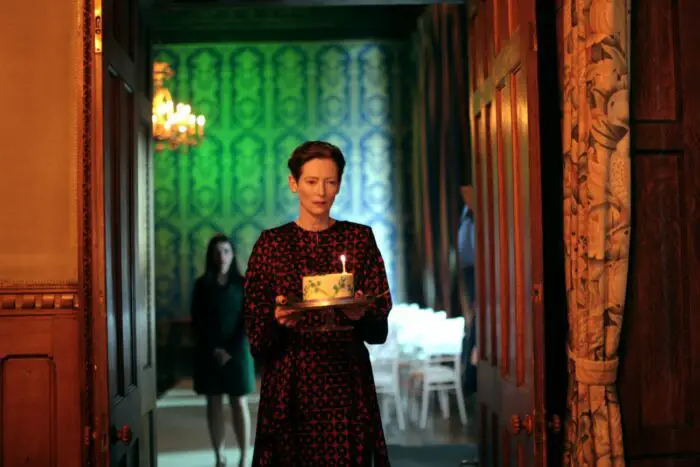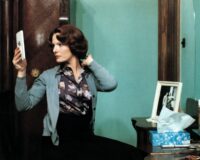The Eternal Daughter is a gothic-inspired ghost story, remnant of Henry James or Charlotte Riddell, which follows Julie Hart (Tilda Swinton) and her mother, Rosalind (also Tilda Swinton), who stay at an old gothic manor converted into a hotel. Although the receptionist (Carly-Sophia Davies) declared the hotel to be booked tight, we never ran into any other guests throughout their stay. The emptiness of this grand estate contributes to the haunted atmosphere and emotional aura of Swinton’s performance, which constantly radiates a sense of melancholy.
We gather through the mother and daughter’s stay that Julie brought her mother to this estate because Julie intends to write a script about her mother’s memories of staying at the estate before it was converted. Rosalind is revealed to be one of the children who was forced to leave London during WWII to stay with relatives in the English countryside. Staying at the hotel, not only happy memories are brought up but sad ones too. As Rosalind reveals more about her original stay at the estate, Julie is filled with remorse and guilt for bringing her mother back to a place that is triggering for her.
Tilda Swinton is a marvelous performer. Her performance of bother mother and daughter is no disappointment. She blends herself into these roles. Writer and director Joanna Hogg’s decision to have Swinton play both mother and daughter casts an eerie, uncanny feeling over the film. Watching Swinton talk to herself and bounce off her own performance is constantly unsettling.
Swinton has this unique ability to make what essentially is a one-woman show, for most of the film feels stuffed with quippy mother/daughter banter. These two characters talk about such mundane things for a great portion of their dialogue together, and yet so much character-building and history is revealed there. Her performance offers a brilliant forum for character study, particularly of white women.
Unfortunately, the only male and black character seen on screen is Bill (Joseph Mydell), the groundskeeper at the hotel. Julie first meets him at night while wandering about the hotel, searching for whatever is making noise. He’s a sweet man, and Joseph Mydell delivers a very gentle performance that softens some of the eerie tones or provides a little comfort to the viewer. Although Bill reveals trauma and loss of his own, his purpose in the story is to act as a buffer for some of Julie and Rosalind’s feelings and offer some wisdom. I don’t want to say this character entirely falls into trope territory for a magical and wise old black man, but it is dangerously close.

There is no real fear in watching this film. The Eternal Daughter is more of a psychological puzzle from A24. Nothing ever seems entirely right. Something always feels off. The lighting, cinematography, and music all contribute to the haunting atmosphere surrounding this old estate. Still, the film’s objective is not to creep into your dream. Moreover, it’s to reflect on belonging and grief. A24 loves a blue-tone color palette, and The Eternal Daughter delivers. Throughout out the film, you can almost feel the chill in the air from these cool tones; it also adds to the ghost story aesthetic of the film.
There is no clear explanation for what is or isn’t real or if any of this eeriness is indicative of something exterior to the emotional journey of Swinton’s characters. The Eternal Daughter feels more like a jumping-off point for discourse and discovery about female familial relationships or the emotional burden of adult children caring for their elderly parents.
There is a great deal unsaid between Julie and Rosalind. Clearly, Rosalind feels much pain triggered by the hotel she once visited when it was her aunt’s estate. Similarly, Julie feels much guilt for bringing her mother to this place that is triggering so much for her mother. Still, alternatively, her mother’s grief is helpful for Julie’s creative endeavors. Joanna Hogg (The Souvenir and The Souvenir Part II) has written two distinguishable, distraught women for Swinton to portray, which comes up in her performances.
However, some moments in The Eternal Daughter felt disconnected, showing the cracks in having one actor portray both characters. At times, scenes felt fragmented and stilted. Perhaps that is an error in performance or editing, or it’s a clever tonal choice that, again, unsettles the viewer into this limbo of understanding what exactly is happening in this hotel room.
Despite the sound effects of creaking windows and whooshing wind, much of the film contains a stillness that reminds me of live theatre. The small cast, the central set creation, and intentionally repetitive sequences all reminded me of independent or small stage plays. Like I said before, some of the scenes where it is just Swinton on screen, the interactions play off like a one-woman show which feels like a very untapped artistic choice in the film medium. We might even go as far as to say that the pre-recording medium would be easier to pull-off one-woman/one-man/one-person performances, yet I feel like we rarely see this kind of casting unless comedically.
The Eternal Daughter is puzzling in the best way. It was a pleasure to watch and to think about hours later. I think Joanna Hogg has created something that we’ll keep revisiting with more questions and admiration as time goes on.


